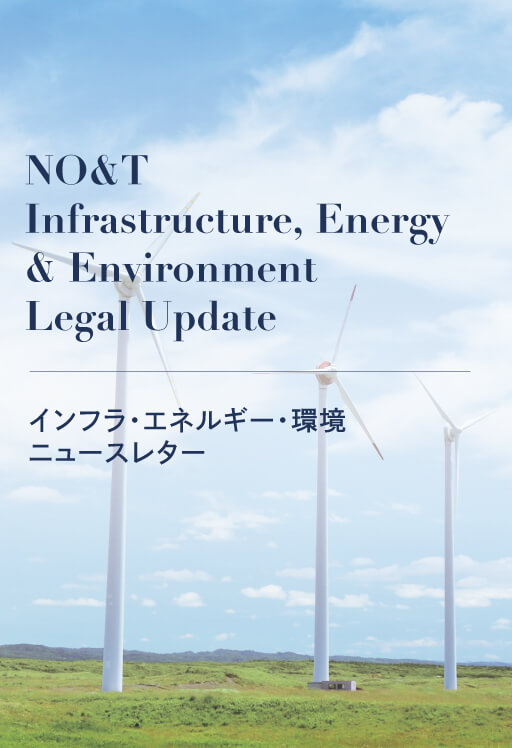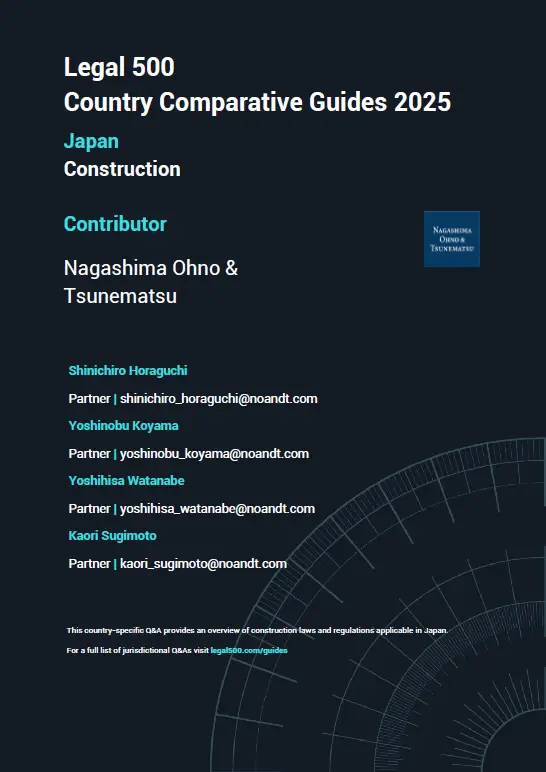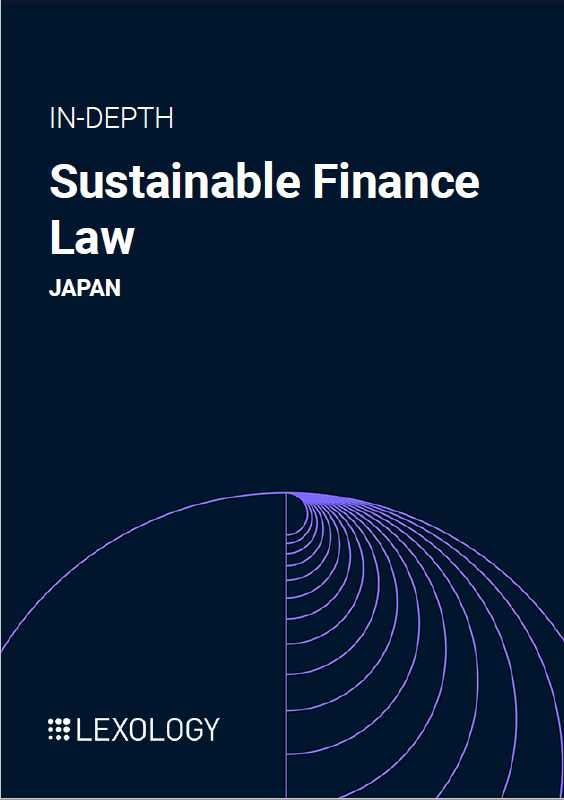
NO&T Infrastructure, Energy & Environment Legal Update
During the 213th Ordinary Session of the Diet, which lasted 150 days from January 26 to June 23, 2024, 61 out of 62 bills submitted by the Cabinet were passed. These included significant laws and regulations related to carbon neutrality, ESG, and sustainability. While the above took place, the 11th GX Implementation Council held on May 13 indicated the formulation of the “GX2040 Vision,” which outlines GX measures targeting the year 2040, and the Ministry of Economy, Trade and Industry’s council commenced discussions on developing the next (7th) Strategic Energy Plan in May. The movement toward achieving a carbon-neutral society in Japan is becoming increasingly active.
This newsletter highlights several important laws and regulations related to climate change and biodiversity conservation that were passed in the last Diet session※1.
The Act on Promotion of Supply and Utilization of Low-Carbon Hydrogen and its Derivatives for Smooth Transition to a Decarbonized, Growth-Oriented Economic Structure (the “Hydrogen Society Promotion Act”) aims to facilitate the supply (domestically produced or imported) and use of low-carbon hydrogen and other resources. By providing support measures to business operators with approved plans, the Act seeks to ensure a smooth transition to a decarbonized, growth-oriented economic structure in line with the objectives of the GX Promotion Act.
Particularly noteworthy are the support measures (support focusing on the price gap and support for the development of hubs) provided through Japan Organization for Metals and Energy Security (JOGMEC). Businesses that manufacture or import low-carbon hydrogen and supply it domestically or businesses that utilize low-carbon hydrogen can, either individually or jointly, create and submit a “Business Plan for Low Carbon Hydrogen Supply, etc.” Upon approval by the competent minister, these businesses will be eligible for grants related to price gap support and support for the development of hubs. Additionally, they may benefit from special provisions concerning the High-Pressure Gas Safety Act, the Port and Harbor Act, and certain road occupancy regulations. The Act, however, does not detail the conditions for subsidies – the details are expected to be fixed by the government in the near future.
The Act is scheduled to come into effect within six months from its promulgation on May 24, 2024, as specified by a Cabinet Order that is to be published – it is announced that the government aims to implement the Act around the summer of 2024.
The Act on Carbon Dioxide Storage Businesses (the “CCS Business Act”) is the first domestic legislation specifically addressing the CCS (Carbon dioxide Capture and Storage) industries. It does not cover the entire CCS value chain, however. The Act primarily focuses on two main areas: (i) establishing a licensing system for exploratory drilling and storage projects and (ii) regulating business and safety standards for pipeline transportation projects.
For storage and exploratory drilling projects, the Minister of Economy, Trade and Industry designates areas where reservoirs exist or are likely to exist as “specified areas.” Through a public solicitation process, the most capable applicant is then selected to conduct the storage or exploratory drilling projects.
The CCS Business Act will be fully enforced on a date specified by the Cabinet Order, which will fall within two years from its promulgation. Ahead of this, regulations related to exploratory drilling will be enforced on a date specified by the Cabinet Order, which will fall within six months from the promulgation.
The “Act on Promotion of Global Warming Countermeasures,” which serves as Japan’s fundamental regulation for promoting global warming countermeasures, has undergone frequent revisions in recent years. The Amendment passed during the last Diet session, which will come into effect on April 1, 2025, except for some provisions, primarily aims to:
The “Act on the Promotion of Activities for Enhancing Biodiversity in Local Communities” was enacted and promulgated on April 19, 2024. Following “Kunming-Montreal Global Biodiversity Framework,” which was adopted at COP15 in December 2022, the government adopted the “2030 National Biodiversity Strategy 2023-2030” in March 2023, with “nature positive” as one of its key pillars. In addition to these government-level actions, companies have become increasingly aware of the importance of biodiversity and natural capital, driven by the recent TNFD (Task Force on Nature-related Financial Disclosure) guidelines.
The aim of the Act is to ensure rich biodiversity and promote the realization of a nature-positive approach by taking measures to enhance biodiversity in local communities. The main points of the Act are:
As the need to transition to a circular economy increases, this Act was enacted to promote the collection, transportation, and recycling of waste, as well as to advance the technology and equipment used in recycling. The goal is to enhance the recycling of resources and significantly reduce greenhouse gas emissions. The Act will come into effect on a date specified by the Cabinet Order, which will fall within a period not exceeding one year and six months from the date of its promulgation (May 29, 2024), except for some provisions.
Under the Act, the following systems are supposed to be established:
The “Act for Partial Revision of the Urban Green Space Conservation Act, etc.” was enacted on May 22, 2024, and promulgated on May 29, 2024.
The Ministry of Land, Infrastructure, Transport and Tourism (MLIT) has recently focused on addressing several global-scale issues: (a) climate change (e.g., actions related to CO2 absorption, energy efficiency, heat control), (b) biodiversity (e.g., procurement of habitat and growth environment for living creatures), and (c) improvement of well-being (e.g., health and optimal childcare environment). These efforts also function as a response to lifestyle changes triggered by the COVID-19 pandemic, and promote the diverse functions of urban green spaces and energy use in urban areas.
The Amendment aligns with the MLIT’s “Urban Development GX” initiative, aiming to establish a framework to facilitate activities by local governments and private businesses to secure urban green spaces.
The key points from the Amendment can be broadly classified into three categories:
The Amendment is scheduled to come into effect within six months from the date of its promulgation.
Of the 62 bills submitted by the Cabinet, the only bill not enacted was the amendment to the “Act on Promoting the Utilization of Sea Areas for the Development of Marine Renewable Energy Power Generation Facilities.” The proposed bill of the Amendment aimed to:
Although the bill was passed by the House of Representatives on May 28, 2024, the House of Councillors resolved unanimously on June 21, 2024, to continue examining it.
*1
For further details of the Hydrogen Society Promotion Act and the CCS Business Act, please see our newsletter “NO&T Japan Legal Update No.46” (July 2024).
This newsletter is given as general information for reference purposes only and therefore does not constitute our firm’s legal advice. Any opinion stated in this newsletter is a personal view of the author(s) and not our firm’s official view. For any specific matter or legal issue, please do not rely on this newsletter but make sure to consult a legal adviser. We would be delighted to answer your questions, if any.


(April 2025)
Shinichiro Horaguchi, Yoshinobu Koyama, Yoshihisa Watanabe, Kaori Sugimoto (Co-author)


(December 2024)
Hiromi Hattori, Yuichi Miyashita (Co-author)


Yuan Yao Lee


Hoai Tran


(December 2024)
Hiromi Hattori, Yuichi Miyashita (Co-author)


(September 2024)
Ryosaku Kondo (Comments)


Yoshihisa Watanabe


Jiro Mikami, Eiji Miyagi, Yoshihisa Watanabe, Saori Kawai (Co-author)